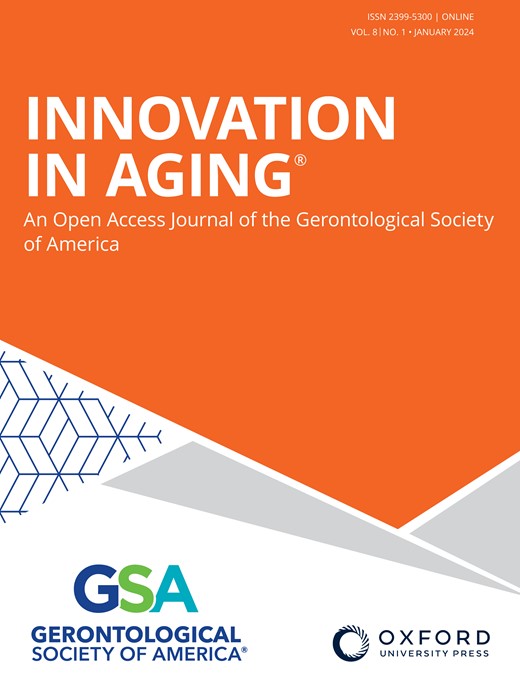INTRINSIC CAPACITY OF OLDER ADULTS IN SINGAPORE USING WHO INTEGRATED CARE FOR OLDER PEOPLE (ICOPE) FRAMEWORK
IF 4.9
3区 医学
Q1 GERIATRICS & GERONTOLOGY
引用次数: 0
Abstract
Abstract The World Health Organization (WHO) proposed the Integrated Care for Older People (ICOPE) approach to guide health systems in better supporting the intrinsic capacity and functional ability of older adults to enable healthy aging (Briggs et al., 2018; de Carvalho et al., 2019). This approach is aligned with Singapore’s Healthier SG initiative, which aims to build a good healthcare system that promotes better health and quality of life for everyone. Recent studies have shown that older adults experience intrinsic capacity decline in various countries, including Singapore, highlighting the importance of targeted interventions to maintain functionality and quality of life in old age (Beard et al., 2019; Liu et al., 2021; Tay et al., 2022). In this cross-sectional study, 367 participants were assessed by 43 ICOPE assessors, of whom 77.4% (n=284) had impairments in intrinsic capacity. The three most prevalent intrinsic capacity impairments were visual impairment (42%), hearing loss (33.5%), and cognitive decline (31.3%), followed by limited mobility (24.3%), malnutrition (16.1%), and depressive symptoms (16.1%). Furthermore, 22.6% of participants were unaware of any elderly care services available in the community, and 8.2% did not know where to seek help in case of problems. These findings emphasize the need for ICOPE assessments at the community level to promote early detection of intrinsic capacity impairments and interventions. More discussion of the care pathway, together with health professionals, older adults, and caregivers, should be the next step to offer diagnostic assessment and guide self-management of intrinsic capacity impairment for among older adults.利用老年人综合护理(ICOPE)框架研究新加坡老年人的内在能力
摘要 世界卫生组织(WHO)提出了老年人综合护理(ICOPE)方法,以指导医疗系统更好地支持老年人的内在能力和功能能力,实现健康老龄化(Briggs 等人,2018 年;de Carvalho 等人,2019 年)。这种方法与新加坡的 "更健康的新加坡政府 "倡议相一致,该倡议旨在建立一个良好的医疗保健系统,促进每个人的健康和生活质量的提高。最近的研究表明,在包括新加坡在内的许多国家,老年人都会出现内在能力衰退的问题,这凸显了采取有针对性的干预措施以维持老年人功能和生活质量的重要性(Beard 等人,2019 年;Liu 等人,2021 年;Tay 等人,2022 年)。在这项横断面研究中,43 名 ICOPE 评估员对 367 名参与者进行了评估,其中 77.4% (n=284)的人存在内在能力障碍。最普遍的三种内在能力障碍是视力障碍(42%)、听力损失(33.5%)和认知能力下降(31.3%),其次是活动受限(24.3%)、营养不良(16.1%)和抑郁症状(16.1%)。此外,22.6% 的参与者不知道社区有任何长者护理服务,8.2% 的参与者在遇到问题时不知道去哪里寻求帮助。这些调查结果表明,有必要在社区层面进行 ICOPE 评估,以促进及早发现内在能力障碍并采取干预措施。下一步应与医疗专业人员、老年人和护理人员一起对护理路径进行更多讨论,以便为老年人提供诊断评估,并指导他们对内在能力损伤进行自我管理。
本文章由计算机程序翻译,如有差异,请以英文原文为准。
求助全文
约1分钟内获得全文
求助全文
来源期刊

Innovation in Aging
GERIATRICS & GERONTOLOGY-
CiteScore
4.10
自引率
0.00%
发文量
72
审稿时长
15 weeks
期刊介绍:
Innovation in Aging, an interdisciplinary Open Access journal of the Gerontological Society of America (GSA), is dedicated to publishing innovative, conceptually robust, and methodologically rigorous research focused on aging and the life course. The journal aims to present studies with the potential to significantly enhance the health, functionality, and overall well-being of older adults by translating scientific insights into practical applications. Research published in the journal spans a variety of settings, including community, clinical, and laboratory contexts, with a clear emphasis on issues that are directly pertinent to aging and the dynamics of life over time. The content of the journal mirrors the diverse research interests of GSA members and encompasses a range of study types. These include the validation of new conceptual or theoretical models, assessments of factors impacting the health and well-being of older adults, evaluations of interventions and policies, the implementation of groundbreaking research methodologies, interdisciplinary research that adapts concepts and methods from other fields to aging studies, and the use of modeling and simulations to understand factors and processes influencing aging outcomes. The journal welcomes contributions from scholars across various disciplines, such as technology, engineering, architecture, economics, business, law, political science, public policy, education, public health, social and psychological sciences, biomedical and health sciences, and the humanities and arts, reflecting a holistic approach to advancing knowledge in gerontology.
 求助内容:
求助内容: 应助结果提醒方式:
应助结果提醒方式:


